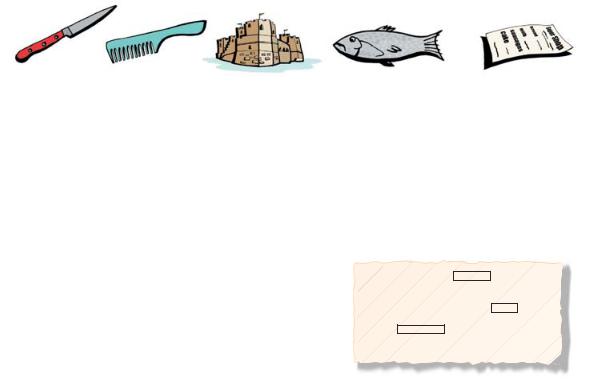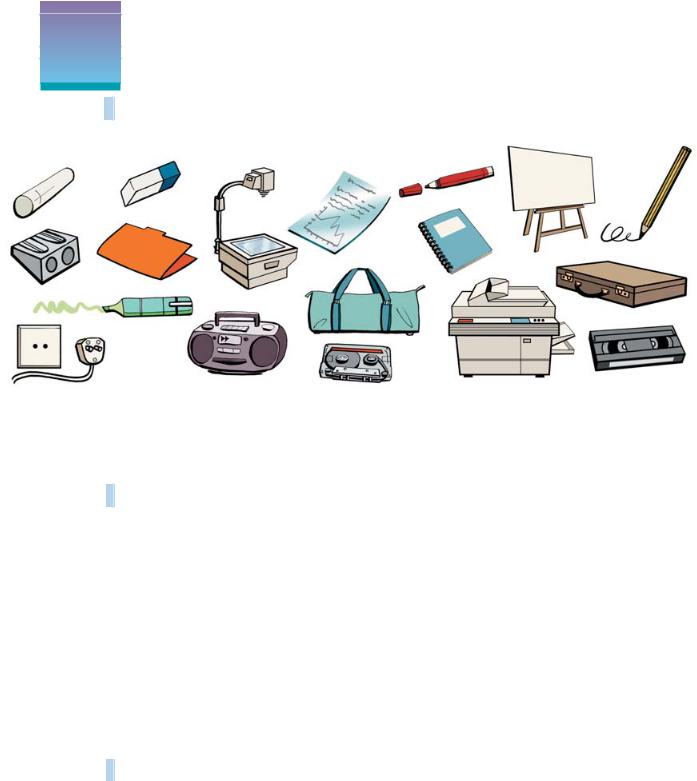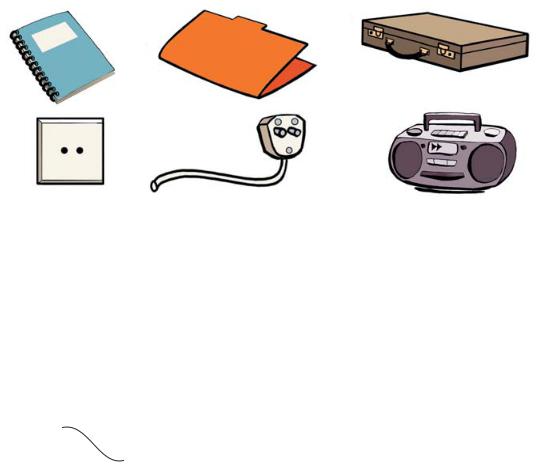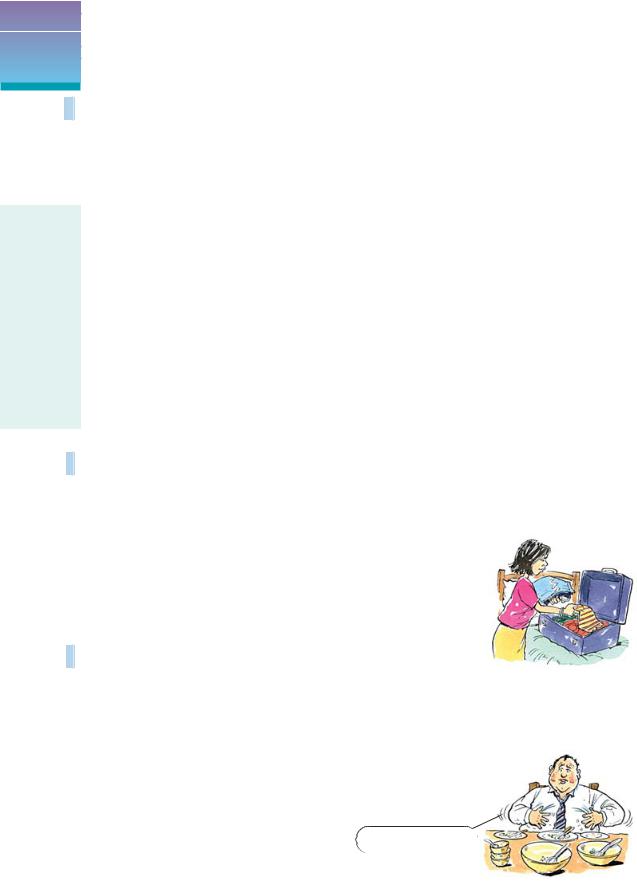
eng_vocabulary_in_use_pre-int_int
.pdf
Exercises
3.1Complete these sentences about dictionary use.
1 |
It’s important to have a good English–English dictionary and also a ..................................... |
||
|
dictionary, which is easier to understand. |
|
|
2 |
Dictionaries show the ..................................... |
using phonemic symbols. |
|
3 |
Dictionaries will tell you if a noun is countable or ..................................... |
|
|
4 |
Dictionaries show synonyms and ..................................... |
where they exist. |
|
5 |
If you meet a word you don’t know, you can try to ..................................... |
the meaning from |
|
|
the context, or you can ..................................... |
it ..................................... |
in a dictionary. |
3.2Right or wrong? If the answer is wrong, correct it.
1 |
Advice is a countable noun. Wrong (advice is an uncountable noun) |
2 |
Homesick means you are unhappy living at home and you want to leave. |
3 |
You don’t make homework, you do homework. |
4 |
Carry on means the same as continue. |
5 |
The opposite of polite is unpolite. |
6 |
The past tense of begin is begun. |
7 |
Dirty is an adjective. |
8 |
If you look up a word, you find the meaning in a dictionary. |
9 |
Trains arrive at and leave from platforms. |
10 Depend is followed by the preposition of.
3.3In the word ‘island’ /a lənd/, the letter ‘s’ is silent (= not pronounced). Use your dictionary to find the silent letters in these words. (Do not include the letter ‘e’ at the end of a word.)
knife |
comb |
castle |
salmon |
receipt |
3.4Use a dictionary to find the answers to these questions about words on the left-hand page.
1 What does tiny mean?
2 How do you pronounce lose? (Is it the same as ‘choose’ or ‘chose’?)
3 What is the opposite of lose a game?
4 What are the past tense and past participle of the verb choose? 5 What noun is formed from the verb choose?
6 What part of speech is homesick?
7 What two verbs often go before homesick?
8 Can you complete this common phrase? law and .....................................
3.5Match the sentences on the left with the different meanings of ‘bar’ on the right.
1They’ve put bars in front of the window for extra security.
2 We went to a bar in the centre of town. 3 Could you get me a bar of chocolate? 4 You have to order drinks at the bar.
bar1 /ba / noun [C] 1 DRINKING a place where alcoholic drinks are sold and drunk, or the area behind the person serving the drinks I met him in a bar in Soho. 2 BLOCK a small block of something solid a chocolate bar • gold bars 3 LONG PIECE a long, thin piece of metal or wood There were bars on the downstairs windows.
English Vocabulary in Use (pre-intermediate & intermediate) 9

4English language words
|
|
A |
Parts of speech |
||
|
|
|
|
|
|
|
|
|
|
nouns |
e.g. chair, information, happiness |
|
|
|
|
verbs |
e.g. choose, tell, complain |
|
|
|
|
adjectives |
e.g. happy, tall, dangerous |
|
|
|
|
adverbs |
e.g. slowly, carefully, often |
|
|
|
|
prepositions |
e.g. in, at, on |
|
|
|
|
articles |
e.g. definite article (the); indefinite article (a/an) |
|
|
|
|
|
|


































 B
B




 Special terms
Special terms
Uncountable noun: (U) a noun which has no plural form and isn’t used with the indefinite article, e.g. Can you send me some information? (NOT an information or informations) Plural noun: (pl) a noun which only has a plural form and isn’t used with the indefinite article, e.g. He was wearing blue trousers and a white shirt. (NOT a blue trouser) Infinitive: the base form of a verb, e.g. We decided to stop for lunch.
Phrasal verb: a verb + adverb or preposition, e.g. wake up, turn sth on, look after sth/sb. Idiom: a group of words with a meaning that is different from the individual words, e.g. never mind, keep an eye on sth, etc.
Transitive verb: a verb which needs a direct object, e.g. The police caught the man [‘the man’ is the direct object of the verb ‘caught’]. A verb which doesn’t need a direct object is intransitive, e.g. Tim and his brother are always arguing.
Informal: a word or phrase which is informal is used mostly in spoken English. Formal English is more common in writing or with people you don’t know very well.
Many words also have synonyms, which are words with the same meaning, e.g. ‘big’ and ‘large’ are synonyms in many contexts. The opposite is ‘small’.


































 C
C




 Word building
Word building
In the word uncomfortable, un- is a prefix, comfort is a root, and -able is a suffix. Other common prefixes include: re-, in- and dis-. Suffixes include: -ity, -ment and -ive.












 D
D




N OT E
Dictionaries usually show stress with a before the main syllable, e.g. re turn.
Pronunciation
Dictionaries show the pronunciation of a word using phonemic symbols, e.g. book /bυk/, before /b fɔ /, cinema /s nəmə/, and so on.
Every word has one or more syllables, e.g. ‘book’ has one syllable, ‘before’ has two syllables, ‘cinema’ has three syllables, and so on.
For pronunciation, it is important to know which syllable has the main stress, e.g. on ‘before’ it is the second syllable (before), and on ‘cinema’ it is the first syllable (cinema), and so on.
E Punctuation |
|
|
|
|
full stop . |
comma , |
brackets ( ) |
hyphen - |
question mark ? |
Hyphens are used to connect certain words or parts of a word together, e.g. a ten-year-old child.
10 English Vocabulary in Use (pre-intermediate & intermediate)
Exercises
4.1There is one word missing in each line of the text. Where does the missing word go? What could it be? What part of speech is it?
Last year I went to →for my holiday. I spent the |
1 |
……………...................................………….. |
Spain (noun) |
||
first week Seville staying with a couple of friends, |
2 ……………...................................………….. |
|
and then I a train to Barcelona, where I spent |
3 ……………...................................………….. |
|
another ten days. It is beautiful city and I had a |
4 ……………...................................………….. |
|
marvellous time. I stayed in a very hotel right in the |
5 ……………...................................………….. |
|
centre, but I didn’t mind spending a lot money |
6 ……………...................................………….. |
|
because it is a wonderful and very convenient. My |
7 ……………...................................………….. |
|
brother recommended it; he goes Spain a lot and |
8 ……………...................................………….. |
|
he stays anywhere else. |
9 ……………...................................………….. |
|
|
|
|
4.2In the dialogue below, find at least one example of the following: an uncountable noun, a plural noun, a phrasal verb, and an idiom.
A: It’s 8 o’clock. We’d better get a move on if we’re going to meet Sue at the airport. B: That’s OK. Her flight doesn’t get in until 8.50.
A: Yes, but it’ll take us an hour to get to the airport – you know what the traffic is like. B: OK. I’ll just go and get changed.
A: What’s wrong with your shorts?
B: I don’t like driving in shorts. I’m going to put some jeans on.
4.3Look at the underlined verbs in these sentences. Which are transitive? Which are
intransitive?
1 She broke her leg.
2 Take off your jacket.
3 I got up at 7.30.
4 She doesn’t like Chinese food.
5 We arrived late.
6 He told me to sit down.
4.4 How many syllables are there in each of these words?
English (2) |
noun |
decide |
informal |
before |
adjective |
education |
opposite |
preposition |
adverb |
understand |
pronunciation |
|
|
|
|
Now mark the main stress on each of the words.
4.5 Look at these words and answer the questions below.
|
|
happy |
lucky |
dangerous |
cheap |
|
|
|
|
|
|||
1 |
What part of speech are these words? |
|||||
2 |
Change each one into an adverb. |
|
|
|||
3 |
Write down a synonym for the first two words. |
|||||
4 |
Which prefix do you need to form the opposite of the first two words? |
|||||
5 |
Write down the opposite of the last two words. |
|||||
English Vocabulary in Use (pre-intermediate & intermediate) 11

5Classroom language


































 A
A



 Equipment
Equipment
These are some of the things you may use in your classroom or school.
rubber |
OHP (overhead |
OHT (overhead |
|
projector) |
transparency) |
board pen |
|
chalk |
|
|
|
file
notebook
bag
pencil sharpener
socket
highlighter (pen)
plug
tape recorder/cassette |
cassette/tape |
photocopier |
recorder |
|
|
|
|
board
pencil
briefcase
video
We can use some of these nouns as verbs: video a programme (= record it on video); photocopy an exercise; highlight new words; file some papers (= put them in a file).


































 B
B




 Classroom activities
Classroom activities
Things students or teachers do in the classroom:
Look up a word (= find the meaning of a word in a dictionary) Borrow someone’s dictionary or rubber (= use it and then return it) Rub out mistakes in a notebook (= remove mistakes using a rubber) Plug in the tape recorder (= put the plug in the electric socket)
Turn up the tape recorder if you can’t hear it (= increase the volume) (opp turn down)
Rub things off the board (= remove writing from the board)
Correct students’ English (= give the correct English if students make mistakes)
Things a teacher may ask students to do in the classroom:
Could you clean the board, Carlos? (= remove all the writing from the board) Write these words down. (= write these words on a piece of paper/in a notebook) Enrique, could you swap places (= change places) with Lorena?
Kim, could you share your book with Petra? (= use it together at the same time) Repeat this sentence after me. (= say it again)


































 C
C




 Questions about vocabulary
Questions about vocabulary
What does ‘plug’ mean? (NOT what means plug?)
How do you pronounce it?
How do you spell ‘bicycle’?
How do you use ‘anyway’ in a sentence?
What’s the difference between ‘lend’ and ‘borrow’?
12 English Vocabulary in Use (pre-intermediate & intermediate)

Exercises
5.1Label these pictures, then check your answers on the opposite page.
1 |
2 |
3 |
4 |
5 |
6 |
5.2Answer these questions.
1 What do you rub off the board? writing
2 What do you put in a tape recorder?
3 What do you put on an OHP?
4 What do you keep in a file?
5 What do you put in a briefcase?
6 What do you put in a socket?
7 What do you use a rubber for?
8 What do you use a photocopier for?
9 Why do you turn up a tape recorder?
10 Why do you share a book with someone?
5.3Match the verbs on the left with the nouns on the right.
1 |
correct |
a |
places |
2 |
clean |
b |
a word |
3 |
borrow |
c |
someone’s mistakes |
4 |
swap |
d |
the board |
5 |
video |
e |
a dictionary |
6 |
do |
f |
a programme |
7 |
turn up |
g |
an exercise |
8 |
look up |
h |
the tape recorder |
5.4Here are some answers. What are the possible questions?
1 |
A: .......................................................................... |
? B: It means to exchange places. |
|||
2 |
A: .......................................................................... |
? |
B: |
/swɒp/ |
Like ‘shop’ or ‘stop’. |
|
|
|
|
...................... |
|
3 |
A: .......................................................................... |
? |
B: S-W-A-P. |
|
|
5.5Think about your last lesson (in English or any other subject). Did you do any of these things?
Did you clean the board? use a rubber? borrow anything? watch a video?
share a book with anyone? look up any words?
make any mistakes?
write anything down in a notebook?
English Vocabulary in Use (pre-intermediate & intermediate) 13

6Prefixes


































 A
A




N OT E
Word stress doesn’t usually change, e.g. happy/unhappy; but it can to emphasise the negative:
A:Was he happy about the change?
B: No, he was very unhappy about it.
With the meaning 'not'
Prefixes can be added to some words to give them a negative meaning.
happy |
unhappy |
like (v) |
dislike (v) |
possible |
impossible |
legal |
illegal (= against the law/wrong) |
correct |
incorrect |
regular |
irregular, e.g. irregular verbs |
|
|
|
|
un- is the most common, e.g. unfriendly, unable, unusual, unnecessary, unemployed
(= without a job), untidy (= not in order; also, in a mess), unkind, unpleasant (= horrible).
in- is often used before words with a Latin origin, e.g. invisible (= cannot be seen), informal, inadequate (= not good enough, e.g. The car park is inadequate for a big supermarket like that).
im- is used before some words beginning with ‘m’ or ‘p’, e.g. impolite, impossible, impatient (someone who is ‘impatient’ wants things to happen now; they cannot wait for things), immoral.
il- can be used before ‘l’, e.g. illegible (= impossible to read because the writing is bad). ir- is only used before a few words beginning with ‘r’, e.g. irresponsible.
dis- is used before some adjectives, e.g. dishonest (a ‘dishonest’ person is someone you cannot trust, and often does not tell the truth), and a few verbs, e.g. dislike, disagree.


































 B
B




 Verb prefixes: un- and dis-
Verb prefixes: un- and dis-
With some verbs, these prefixes can also mean ‘the opposite of an action’.
The plane appeared in the sky, then suddenly disappeared behind a cloud.
I locked the door when I left, but then I lost the key and couldn’t unlock it when I got back.
I got dressed (= put on my clothes) and had my breakfast. I got undressed (= took off my clothes) and got into bed.
I had to pack my suitcase/do my packing (= put everything in it) very quickly, so when I unpacked (= took things out)
at the hotel, most of my clothes looked terrible.


































 C
C




 Other verb prefixes with specific meanings
Other verb prefixes with specific meanings
re- (= again) |
The shop closed down but it’ll reopen next month. |
|
I failed my exam but I can retake/redo it next year. |
over- (= too much) |
My boss is overdoing it at the moment. (= working too hard) |
|
I went to bed very late and I overslept (= slept too long) this morning. |
|
The shop assistant overcharged me. |
|
(= asked me for too much money) |
mis- (= badly or |
I’m afraid I misunderstood what he said. |
incorrectly) |
Two of the students misread the first question. |
|
Maybe I overate. |
14 English Vocabulary in Use (pre-intermediate & intermediate)
Exercises
6.1What’s the opposite of these words? (The words in the last column are verbs, the rest are adjectives.)
1 |
un happy |
5 |
patient |
9 |
.......polite |
13 ....... |
lock |
|
....... |
|
....... |
|
|
|
|
2 ....... |
correct |
6 |
.......regular |
10 ....... |
visible |
14 ....... |
pack |
3 ....... |
legible |
7 |
.......friendly |
11 ....... |
employed |
15 ....... |
agree |
4 ....... |
possible |
8 |
.......formal |
12 ....... |
honest |
16 ....... |
like |
6.2What’s the reverse of these actions?
1 |
do one’s packing unpack |
3 |
appear |
2 |
lock the door |
4 |
get dressed |
6.3Agree with these sentences, using a synonym from the left-hand page for the underlined words.
1 It’s against the law, isn’t it?
Oh yes, it’s |
illegal. |
|
.............. ....................... |
2His room is always in a mess, isn’t it?
Yes, it’s very ......................................
3He took off his clothes!
Yes, he got ......................................
4 This handwriting is impossible to read.
Yes I know, it’s completely ......................................
5She can never wait for five minutes, can she?
No, she’s very ......................................
6 The conference centre wasn’t good enough for 500 people, was it?
No, it was completely ...................................... for that number.
7She’s horrible sometimes.
Yes, she can be very ......................................
8I’m afraid they sometimes steal things and tell lies.
I know. They’re both ......................................
6.4Complete the verbs in these sentences.
1 |
I completely disagree |
|
with him on this subject. |
||
|
...................................... |
|
|
|
|
2 |
I’m sorry, I mis...................................... |
|
her message. |
|
|
3 |
We un...................................... |
as soon as we got to the hotel, then went out for a walk. |
|||
4 |
She was here a minute ago, then she dis...................................... |
|
. I don’t know where she is |
||
|
now. |
|
|
|
|
5 |
My homework was so bad that I’ll have to re...................................... |
it. |
|||
6 |
Her alarm clock didn’t go off and she over...................................... |
|
|
||
7 |
She finally managed to un...................................... |
|
the door and we were able to go inside. |
||
8 |
I dis...................................... |
the film, but the others enjoyed it. |
|||
9 |
I don’t think I’ll pass the exam, but I can always re...................................... |
it in September. |
|||
10 |
She’s over...................................... |
things at the moment. She needs a complete break from |
|||
|
her job. |
|
|
|
|
11 |
The post office shuts for lunch but it should re...................................... |
at 2.00 pm. |
|||
12 |
I was very angry because they over...................................... |
|
me by about £5 in that shop. |
||
6.5Keep several pages in your notebook for verbs or adjectives which combine with these prefixes. You can add new words to your lists and test yourself at the same time.
English Vocabulary in Use (pre-intermediate & intermediate) 15

|
|
|
|
|
|
|
|
|
|
|
|
|
Noun suffixes |
|
|
|
|
|
|
|
|
|
|
|
|
|
|
|
|
|
|
|
|
|
|
|
|
|
|
|
|
|
|
|
|
|
|
|
|
|
|
|
|
|
|
|
|
|
|
|
|
|
|
|
|
|
|
|
|
|
|
|
|
|
|
|
|
|
|
|
|
|
|
|
|
|
7 |
|
|
|
|
|
|
|
|
|
|
|
|
||
|
|
|
|
|
|
|
|
|
|
|
|
|
Verb + noun suffix |
|
|
|
|
|
|
|
|
|
|
|
|
|
|
|
|
|
|
|
|
|
|
|
|
|
|
|
|
|
|
|
|
|
|
|
|
|
|
|
|
|
|
|
|
|
|
A |
|
|
|
|
|
|
|
|
|
|
|
|
|
|
|
|
|
|
|
|||||
|
|
|
|
|
|
|
|
|
|
|
|
|
|
|
|
|
|
|
|
|
|
|
|
|
|
|
|
|
|
verb |
suffix |
noun |
|
|
|
|
|
|
|
|
|
|
|
|
|
|
|
|
|
|
|
|
|
|
|
|
|
|
|
|
|
|
|
improve (= get better) |
-ment |
improvement |
|
|
|
|
|
|
|
|
|
|
|
|
|
|
govern (= control affairs of a city or country) |
|
government |
|
|
|
|
|
|
|
|
|
|
|
|
|
|
manage (= direct or control a business) |
|
management |
|
|
|
|
|
|
|
|
|
|
|
|
|
|
elect (= choose somebody by voting) |
-ion |
election |
|
|
|
|
|
|
|
|
|
|
|
|
|
|
discuss (= talk about something seriously) |
|
discussion |
|
|
|
|
|
|
|
|
|
|
|
|
|
|
inform (= tell someone something) |
-ation |
information |
|
|
|
|
|
|
|
|
|
|
|
|
|
|
jog (= running to keep fit or for pleasure) |
-ing |
jogging |
|
|
|
|
|
|
|
|
|
|
|
|
|
|
spell (e.g. S-P-E-L-L) |
|
spelling |
|
|
|
|
|
|
|
|
|
|
|
|
|
|
|
|
|
|
|
|
|
|
|
|
|
|
|
|
|
|
|
There has been a big improvement in the economy. Who do you think will win the election? |
|||
|
|
|
|
|
|
|
|
|
|
|
|
|
The problems are due to bad management. |
I’m not very good at spelling. |
||
|
|
|
|
|
|
|
Adjective + noun suffix |
|
|
|
||||||
|
|
|
|
|
|
|
|
|
B |
|
|
|
|
|
||
|
|
|
|
|
|
|
|
|
|
|
|
|
|
|
|
|
|
|
|
|
|
|
|
|
|
|
|
|
|
adjective |
suffix |
noun |
|
|
|
|
|
|
|
|
|
|
|
|
|
|
|
|
|
|
|
|
|
|
|
|
|
|
|
|
|
|
|
weak (opp strong) |
-ness |
weakness |
|
|
|
|
|
|
|
|
|
|
|
|
|
|
happy |
|
happiness |
|
|
|
|
|
|
|
|
|
|
|
|
|
|
ill (= sick/not well) |
|
illness |
|
|
|
|
|
|
|
|
|
|
|
|
|
|
stupid (opp intelligent, clever) |
-ity |
stupidity |
|
|
|
|
|
|
|
|
|
|
|
|
|
|
active |
|
activity |
|
|
|
|
|
|
|
|
|
|
|
|
|
|
similar (= almost the same; opp different) |
|
similarity |
|
|
|
|
|
|
|
|
|
|
|
|
|
|
|
|
|
|
We have a weak government. She was ill for a long time. The two boys are quite similar.
What’s her main weakness as a manager? Hepatitis is a very serious illness.
There is a similarity between all three sons.


































 C
C




 Pronunciation
Pronunciation
Adding a suffix to a verb or adjective may change the pronunciation.
verb |
noun |
|
adjective |
noun |
|
|
|
|
|
educate |
education |
|
similar |
similarity |
advertise |
advertisement |
|
stupid |
stupidity |
|
|
|
|
|



































 D
D



 -er/-or and -ist
-er/-or and -ist
These suffixes can be added to nouns or verbs. They often describe people and jobs.
-er |
-er |
-or |
-ist |
|
|
|
|
ballet dancer |
bus driver |
television actor |
artist, e.g. Picasso |
pop singer |
shop manager |
film director |
economist |
murderer (= person) |
professional footballer |
translator |
psychologist |
who kills someone) |
employer |
computer operator |
journalist |
|
|
|
|
16 English Vocabulary in Use (pre-intermediate & intermediate)
Exercises
7.1Complete the tables and mark the stress on each word. The last two in each column are not on the opposite page, but do you know or can you guess the noun formed from them?
verb |
noun |
|
adjective |
noun |
|
|
|
|
|
educate |
.................................... |
|
stupid |
.................................... |
improve |
.................................... |
|
happy |
.................................... |
jog |
.................................... |
|
weak |
.................................... |
govern |
.................................... |
|
similar |
.................................... |
spell |
.................................... |
|
active |
.................................... |
hesitate |
.................................... |
|
sad |
.................................... |
arrange |
.................................... |
|
popular |
.................................... |
|
|
|
|
|
7.2Combine words on the left with the correct suffix on the right to complete the text.
improve |
televise |
weak |
govern |
|
-ment |
-ity |
-ness |
elect |
educate |
manage |
stupid |
|
-ion |
-ation |
|
|
|
|
|
|
|
|
|
In his first broadcast on (1) |
television |
.....................................since he won the (2) |
last |
||
|
|
..................................... |
|
|
|
month, the Prime Minister promised to make health and (3) |
..................................... |
his top |
|||
two priorities. |
|
|
|
|
|
And in a strong attack on the previous (4) |
..................................... |
, he said that the present |
|||
(5) ..................................... |
of the British economy was caused by their (6) ..................................... |
|
|||
and bad (7) ..................................... |
|
. He said things were going to change, and he hoped the |
|||
British people would be able to see a big (8) ..................................... |
|
in the economy by the |
|||
end of the year. |
|
|
|
|
|
|
|
|
|
|
|
7.3Write down the name of the person who does these things as a job.
1 |
drive |
driver |
3 |
act .................................. |
5 |
economics .................................. |
|
|
................................. |
|
|
|
|
2 |
translate ..................................... |
4 |
psychology .................................. |
6 |
football .................................. |
|
7.4Match words from left and right to find the names of eight jobs.
pop |
bus |
|
psychologist |
dancer |
shop |
child |
|
singer |
manager |
film |
ballet |
|
operator |
driver |
computer |
professional |
|
footballer |
director |
|
|
|
|
|
7.5Complete the definitions below.
1 |
An employer is a person or company that |
employs people. |
|
|
................................ ......................................... |
2 |
A murderer is a person who .......................................................................... |
|
3 |
A bank manager is a person who .......................................................................... |
|
4 |
A television actor is a person who .......................................................................... |
|
5 |
A translator is a person who .......................................................................... |
|
6 |
A lorry driver is a person who .......................................................................... |
|
7 |
A journalist is a person who .......................................................................... |
|
8 |
An artist such as Picasso is a person who .......................................................................... |
|
English Vocabulary in Use (pre-intermediate & intermediate) 17

8Adjective suffixes


































 A
A



 Noun or verb + suffix
Noun or verb + suffix
noun or verb |
suffix |
adjectives |
|
|
|
danger, fame |
-ous |
dangerous, famous (= known by lots of people) |
music, politics, emotion, |
-al |
musical, political, emotional (= have or show |
economics, industry |
|
strong feelings), economical (= saves you money), |
|
|
industrial (= connected with industry and factories) |
cloud, sun, fog, dirt |
-y |
cloudy, sunny, foggy, dirty (opp clean) |
attract, create |
-ive |
attractive (= pretty, good-looking); creative (= ability |
|
|
to produce new ideas; with imagination) |
|
|
|
The roads were dangerous this morning: it was foggy and I couldn’t see far.
He was very emotional when he said ‘goodbye’.
Did you buy a diesel car because it’s more economical than petrol?
I’m afraid you’ll have to clean the floor – it’s very dirty.


































 B
B




 -able
-able
This common suffix creates adjectives from nouns and verbs:
an enjoyable evening a comfortable chair Jeans are still fashionable.
suitable (= right/correct for a situation), e.g. A grey suit is very suitable for a wedding.
Sometimes -able means ‘can be done’:
washable (= can be washed), e.g. Is this jacket washable?
reliable (= can be trusted), e.g. I’ve never had a problem with the car – it’s very reliable.
Words ending -able quite often express the opposite meaning with the prefix un-: unsuitable (= not right/correct for a situation), e.g. Jeans are unsuitable for weddings. unbreakable (= cannot be broken), e.g. The glass in the shop window is unbreakable.
Words ending -ible sometimes add the prefix in- to form an opposite: incomprehensible (= cannot be understood), e.g. This street map is incomprehensible.
invisible (= cannot be seen), e.g. Trees surround the house, so it’s invisible from the road.


































 C
C




 -ful and -less
-ful and -less
-ful often means ‘full of’ or ‘having the quality of the noun’: careful (= doing sth with care and attention), e.g. careful driver
helpful (= able to help), e.g. Her advice was very helpful. painful (= giving pain), e.g. It was painful when I hit my hand.
useful (= has a lot of use), e.g. I found it a useful book. painful thoughtful thoughtful (= kind and thinks of others)
-less often means ‘without’:
careless (= without care, and causing mistakes), e.g. His work is full of careless mistakes. useless (= without use and often terrible), e.g. This knife is useless – it won’t cut anything. homeless (= with nowhere to live), e.g. Many families are homeless because of the war.
18 English Vocabulary in Use (pre-intermediate & intermediate)
